by Monstra Errátika
Escrevi esse textinho na madrugada de hoje, voltando de Viena.
Já passa das 03 da manhã. Eu estou num ônibus que saiu de Viena às 21h em direção a Berlim e não consigo pensar em outra coisa que não seja o racismo europeu.

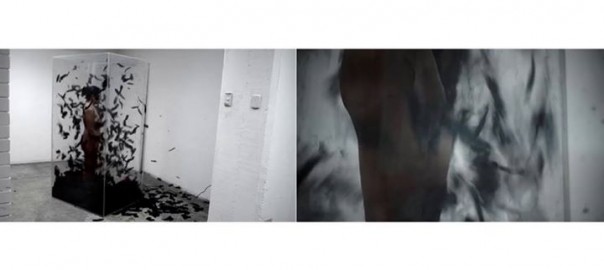
by Monstra Errátika
Escrevi esse textinho na madrugada de hoje, voltando de Viena.
Já passa das 03 da manhã. Eu estou num ônibus que saiu de Viena às 21h em direção a Berlim e não consigo pensar em outra coisa que não seja o racismo europeu.
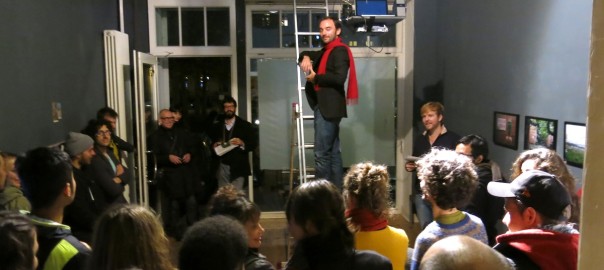
Transnational Dialogues’ European residency starts in Berlin this September (22-28/09), before continuing to Belgrade for the TRANSEUROPA Festival (1-5/10) and ending with a two-day event in Venice (10-11/10, details online soon). Artist, entrepreneurs, architects, researchers, designers, cultural managers and various individuals that live and work across Brazil, China and Europe will create a temporary space for exchange that reflects the programme’s transnational character (see profiles here and here).
You are welcome to join our first discussion and help us in shaping the future of Transnational Dialogues. Following last year successful event (see cover photo), we will go back to Kreuzberg Pavillon, one of Berlin best-known avantgarde venues for artistic exchange. Meet us there for a late coffee or an early drink from 5pm until 10pm on Sunday 27 September (registration is not necessary; feel free to pop up anytime). Transnational Dialogues is an open doors programme and we are always looking forward to new artistic and intellectual collaborations. Continue reading Open Doors Discussion – Berlin, 27 September 2015
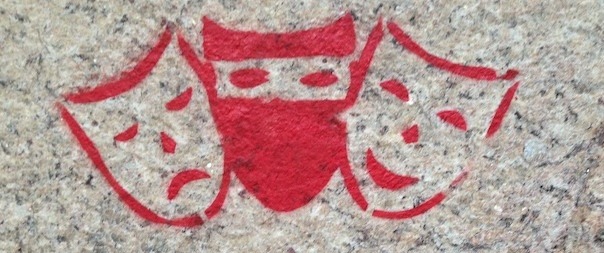
In the occasion of the opening of the 56th Art Biennale in Venice, we present you once more an article by the curator of the Brazilian Pavilion, Luiz Camillo Osorio. The full article can be accessed in the Transnational Dialogues Journal 2014 (pp. 11-15, PORTUGUESE, CHINESE and ENGLISH).
To what extent can art continue to be art and simultaneously be politics? To what extent can the political intervention simultaneously be politics and point towards a heterogeneous sensible proper to art making? How to talk about this political pretension of arts or the artistic reverberation of politics, now that both artistic and political institutions are in crisis?
Em que medida a arte pode ser arte e ser ao mesmo tempo política? Em que medida a intervenção política, pode ser política e ao mesmo tempo sinalizar para um sensível heterogêneo próprio ao fazer artístico? Como falar desta pretensão política da arte ou da reverberação artística da política hoje quando as instituições artísticas e políticas estão em crise?
艺术究竟在何种程度上可以是艺术,同时又是政治?在何种程度上,政治介入可以是政治,同时又表现为艺术符号,艺术行为特有的敏感异化。当今艺术与政治机构都处于危机之中,如何来述说艺术的政治企图,或政治的艺术回音?
Luiz Camillo Osorio is Professor in the Philosophy Department of PUC-Rio and Curator of the Museum of Modern Art of Rio de Janeiro (MAM-Rio).
[Cover photo: “Vandalismo Poetico”, found in the streets of Flamengo, Rio de Janeiro, March 2015]
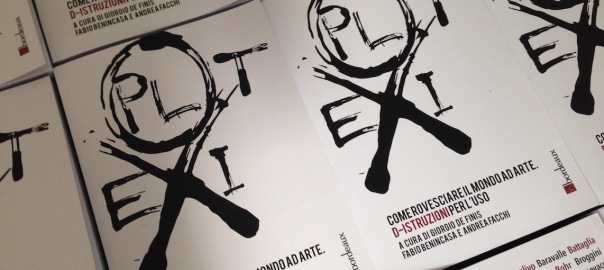
Two articles originating from past activities and current researches of Transnational Dialogues have been featured in the most recent publication “Exploit. Come rovesciare il mondo ad arte. D-istruzioni per l’uso”. The book originates from the experience of MAAM – Metropoliz, an impromptu museum located in the outskirts of Rome, which has been founded by anthropologist Giorgio De Finis, one of the book’s editors. Among the many contributors are Hans Ulrich Obrist, Chantal Mouffe, David Graeber, Dora Garcia, Cesare Pietroiusti, Annie Cohen-Solal and Lorenzo Romito. Continue reading Exploit or How to Overturn the World with Art
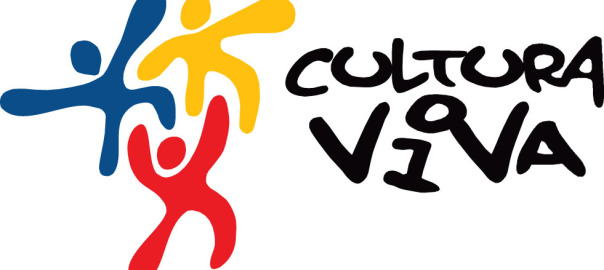
Q: The reform brought by the Pontos de Cultura (‘Culture Hotspots’) in 2010 is considered revolutionary in the management of the public spending from the State towards the cultural sector. What has worked? What has not? As for the latter case, why so?
A: The idea behind the Culture Hotspots is that the State must have the means to strengthen initiatives that already exist in the society. In this sense, the aim was to approach culture and citizenship, to build a shared management between the society and the public authorities, as well as to propel the most diverse languages – from the traditional popular culture to the experimentation with new technologies. The Culture Hotspots helped consolidating and brought scale to thousands of spontaneous and well-succeeded initiatives…
Read the rest of the interview in the Transnational Dialogues Journal 2014 (pp. 52-55, ENGLISH and PORTUGUESE).
Juca Ferreira is a sociologist and the current Minister of Culture of Brazil. Luigi Galimberti and Lorenzo Marsili, the interviewers, are coordinators of Transnational Dialogues.
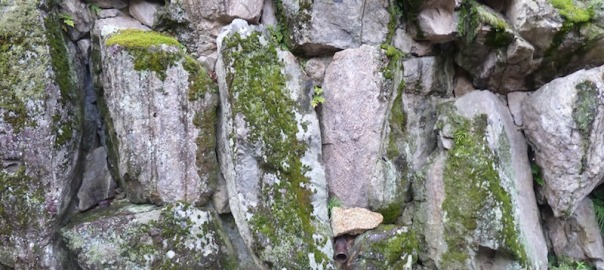
by Hu Fang (胡昉)
Always arrive late.
When I reached the garden in Kyoto, the door stood ajar, the abbot had departed, only some rocks were left in the sand where gravel traces he combed out, like the imprint of the body left by lovers, remained.
总是太晚的到达。
当我到达京都这座园林,园门虚掩着,方丈已经离去,只留下矗立在沙砾之中的一堆乱石,沙砾上还残留着他刚刚梳耙过的痕迹,犹如床单上余留着的爱人身体的印痕。
Read the rest of the article in the Transnational Dialogues Journal 2014 (pp. 20-22, CHINESE and ENGLISH).
Hu Fang (胡昉) is a novelist, art critic, and the co-founder and artistic director of Vitamin Creative Space in Guangzhou.
Cover photo by Hu Fang
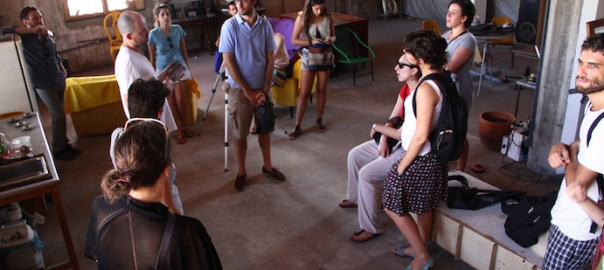
by Tatiana Richard
Brazil’s economic context along with its regionalization directly influences the artistic production, historically concentrated on big urban centers, such as Rio de Janeiro and São Paulo, ultimately gaining capillarity in locations like Recife, a city now recognized as a major producer of contents related with new technologies. Its cultural investments take place through several programs and projects, which have the tax incentives laws as main funding method. Yet, why is there a permanent dissatisfaction regarding public investments, especially among artists?
Read the rest of the article in the Transnational Dialogues Journal 2014 (pp. 48-49, PORTUGUESE and ENGLISH).
Tatiana Vieira Assumpção Richard is Public Manager of Cultural Promotion for the Government of the State of Rio de Janeiro and researcher in the field of economy and funding for culture.
[Cover photo: “Transnational Dialogues at Fabrica de Bhering, Rio de Janeiro, February 2014” by Tahian Bhering]
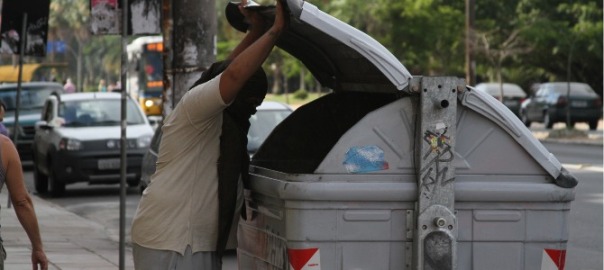
by Jota Mombaça
I live in North-east Brazil. In a city that I call Natown. The sun is constantly burning over our heads. The waterside is taken up by hotels, luxury buildings, kiosks, restaurants and clubs. I live where you spend vacation. A city from the tropics, built as a tourist paradise. This implies, most obviously, an organization of urban space focused on sanitized areas – where the tourists go – to the detriment of other parts of the city, that are increasingly more precarious. But there are also less obvious consequences. Throughout this text, I would like to reflect on how the tourist character of my town interferes with the cultural politics aimed at local artistic production, by regulating the types of projects that get, or don’t get public funding, as well as their visibility and conditions for continuity…
Read the rest of the article in the Transnational Dialogues Journal 2014 (pp. 26-29, PORTUGUESE, CHINESE and ENGLISH).
Jota Mombaça is a writer, performer and autonomous researcher. He is a participant in Transnational Dialogues 2014.
[Cover photo “Ao lumpenproletariado do i-mundo” by Camila Melo]
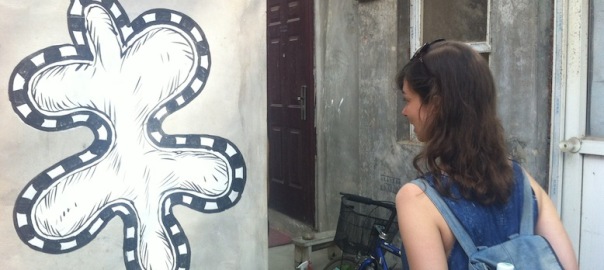
by Andressa Vianna and Chico Daviña
Place yourself in a spot at an unfamiliar street for you and remain there.
Place yourself on the space and remain.
Observe how the objects and people around you are situated.
Do you represent an obstacle to something? Do you diverge from the rhythm composed in there? Do you feel material or immaterial being there? Is there any embarrassment involved? Being in such position, what in you and in what do you have an affect on?
Read the rest of the article in the Transnational Dialogues Journal 2014 (pp. 56-57, PORTUGUESE, CHINESE and ENGLISH).
Andressa Vianna is a multimedia producer, who loves the intersection between technologies (old and new) in social and civil matters. Chico Daviña is an independent researcher based in São Paulo.
[Cover photo: “Transnational Dialogues 2014: On our way to Flickingforehead!, Beijing, June 2014”; photo by Andressa Vianna]
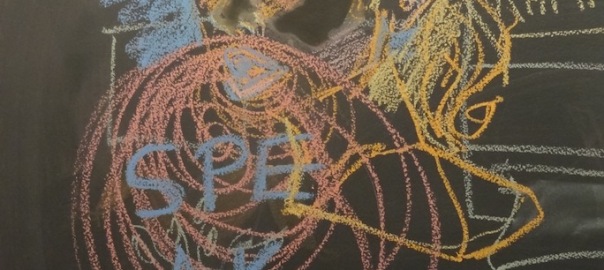
Mika Conradie and Molemo Moiloa of VANSA, the Visual Arts Network of South Africa, tell us about the development of a code or set of principles of practice in the South African artistic and cultural field, which is characterized by the recent development of its post-apartheid infrastructure. This article continues the discussion over cultural policies that has started with Brazil and China in the recently published Transnational Dialogues Journal 2014.
The Visual Arts Network of South Africa (VANSA), through the support of the National Arts Council of South Africa, has commissioned research towards a national code of practice for the Visual Arts. Taking a cue from this international and principally ‘global north’ practice, we looked at various codes that have been developed in parts of Europe, in Australia and North America. Continue reading Toward a Principle of Practice: Mobilities and Responses
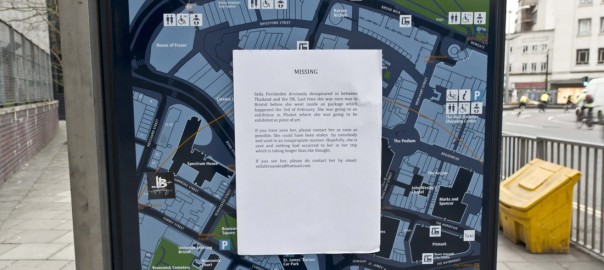
Within the Global Players Residency (Chongqing, 9-29 June 2014), artist and researcher Seila Fernandez Arconada has developed a series of workshops and seminars in collaboration with other international and Chinese artists alike. A handful of posters are here to witness Seila’s efforts in establishing those transnational dialogues.
The Global Players Residency Programme was born in collaboration with Organhaus Chongqing and has received additional support from Goethe-Institut China and the Artists’ International Fund of the British Council and Arts Council England.
Cover photo: “Seila Fernandez Arconada”, 2013, an artistic project by Seila Fernandez Arconada.
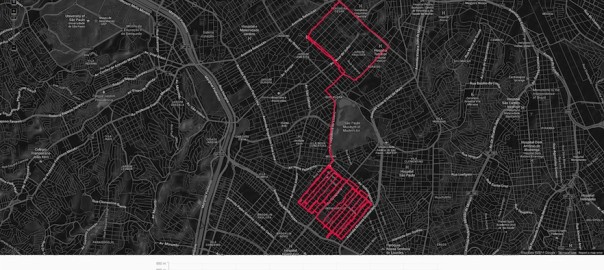
Debates e reflexões a partir da Brazilian Caravan, parte do projeto Transnational Dialogues 2014 / Debates and reflexions from the Brazilian Caravan experience, part of the project Transnational Dialogues 2014 / Raphael Franco
An English version of the article is available here.
O século XX trouxe uma série de processos transformadores para a humanidade. A globalização (ou mundialização) aproximou os continentes, imprimindo na sociedade dinâmicas econômicas e políticas que, naturalmente, tiveram impacto nos âmbitos social e cultural. Alem do acesso a novos meios de produção e mercadorias, a globalização abriu caminho para maior acesso à informação e facilidade de fluxos transitórios. Com isto, processos de reflexão crítica também se tornaram mais freqüentes, através da inter-conexão entre diversos grupos, organizações, instituições e indivíduos.
Continue reading O espaço, seus acessos e usos / The Space, its Accesses and Uses